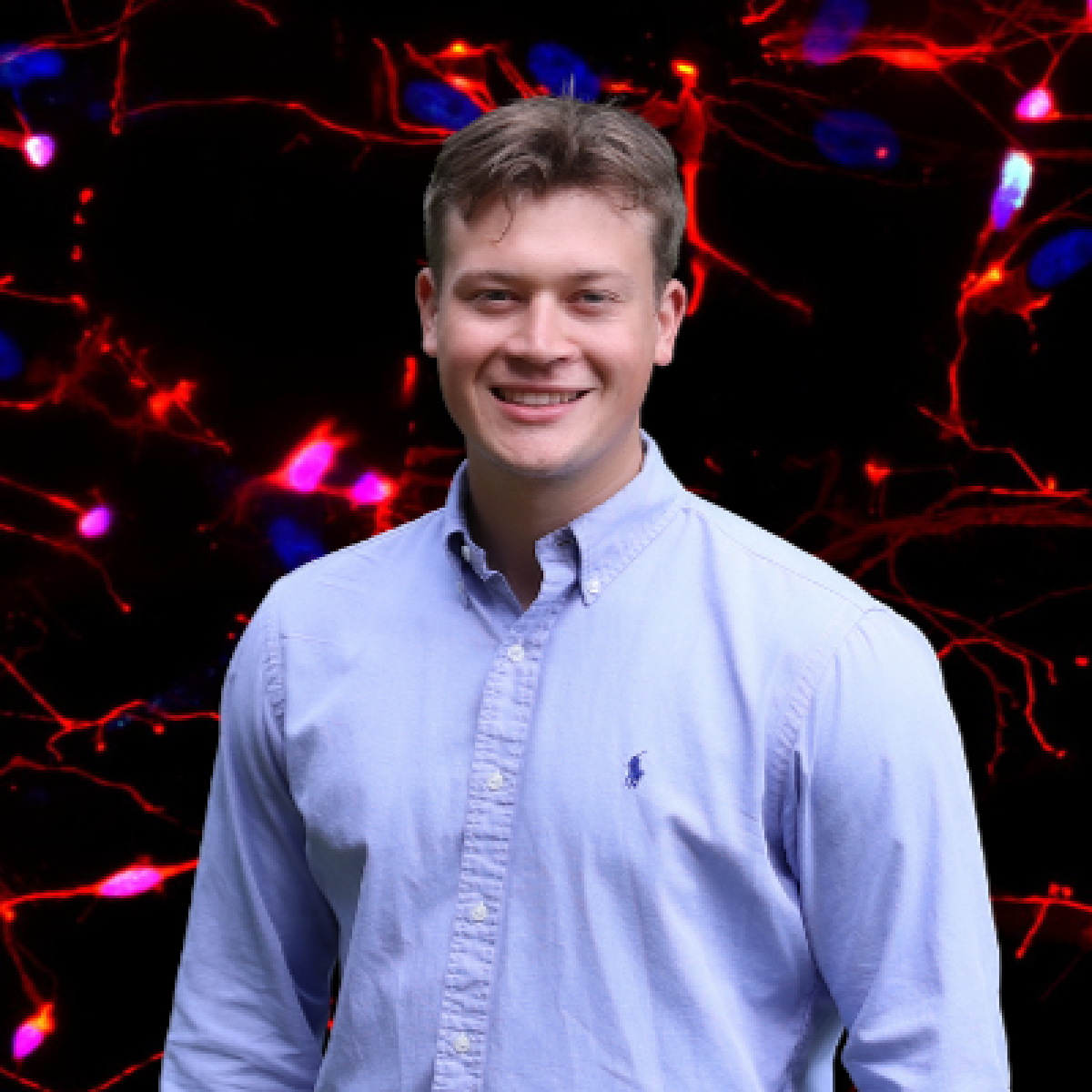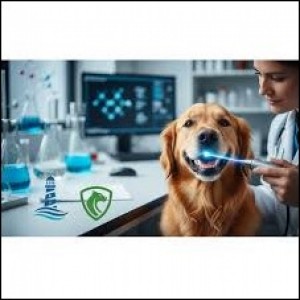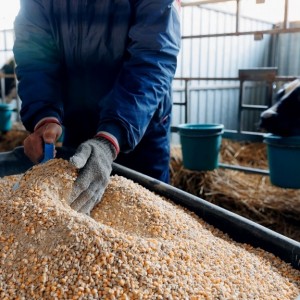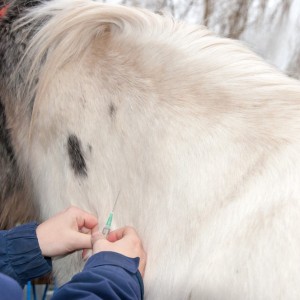Studying Dogs with Neurogenerative Diseases: Findings Contribute to Understanding of Human Neuropathy
In humans, peripheral nerve degeneration can cause progressive muscle weakness, foot deformities, and sensory deficits. One way to learn about human hereditary peripheral neuropathy (HPN) is to study domestic dogs with neurodegenerative diseases. For example, Labrador Retrievers often experience a late-onset peripheral neuropathy (LPN) (commonly known as laryngeal paralysis or GOLPP) and are a promising canine model for gaining insights about peripheral neuropathy in humans. Ryan Anderson (BS’22), a third-year Doctor of Veterinary Medicine/PhD student, has been awarded a National Institutes of Health (NIH) F30 Fellowship to study the pathologic and molecular basis of LPN and establish it as a canine model for HPNs. The NIH F30 fellowships are prestigious, six-year fellowships that support research and clinical training for students in dual-degree programs, like Anderson.
Establishing Labrador LPN as a canine model for human HPNs
Anderson’s project, entitled “Establishing the neuropathologic and molecular features of a spontaneous canine model of peripheral neuropathy,” will investigate the neuropathologic architecture of the neuromuscular junction and corresponding peripheral nerves in LPN-affected Labradors and a control group of unaffected dogs. He will also use a novel cell culture neuron model to study cellular dysfunction associated with the disease.
“The work performed under this award will contribute to the establishment of Labrador LPN as a spontaneous canine model for human axonal HPNs,” Anderson says. “In the future, this model will be used as the critical link to human clinical trials, serving to assist in the discovery of a treatment for this disorder.”
Anderson will conduct his research in the labs of his PhD advisor, Susannah Sample (MS’07 DVM’09 PhD’11; Department of Surgical Sciences) and one of his PhD mentors, Masatoshi Suzuki (Department of Comparative Biosciences). Project co-sponsor John Svaren (Department of Comparative Biosciences) will also support Anderson’s work.
Anderson has identified a novel variant in a robust candidate gene that strongly associates with LPN-affected Labradors. He aims to understand how this variant contributes to axonal degeneration. He also plans to evaluate the functional effect of the variant on its gene and protein product.
“Uncovering the molecular mechanisms contributing to axon degeneration in Labrador LPN is essential in identifying overlapping treatment targets between Labrador LPN and human axonal HPNs,” he says. “We will identify abnormalities associated with Labrador LPN, using a novel induced-motor neuron model.”
Sparking an interest in LPN in Labrador Retrievers
Anderson grew up in Racine, caring for his family pets, and attended UW-Madison to study biomedical engineering with a focus on tissue engineering and biomechanics. While earning his degree, he completed a Biocore honors certificate, which sparked his interest in research. He was one of 100 undergraduates at the UW to be awarded the prestigious Hilldale Research Fellowship and joined the Comparative Genetics and Orthopeadic Research Laboratory, co-directed by Dr. Sample and Dr. Peter Muir (Department of Surgical Sciences) at the SVM to study LPN in Labrador Retrievers.
“Witnessing the debilitating effects of this condition motivated me to delve deeper into understanding the disease and working toward potential treatments,” he says. “At the same time, observing Dr. Sample and Dr. Muir’s roles as veterinary clinician-scientists inspired me to pursue a similar career, leading to my decision to apply for the DVM/PhD program at UW-Madison.”
His PhD research in Sample’s lab focuses on identifying the neuropathologic features, genomic alterations, and molecular abnormalities associated with Labrador Retriever late-onset peripheral neuropathy.
“Recently, I leveraged my tissue engineering background to develop a novel neuron cell culture model to study motor neuron diseases—an approach that had not previously been applied to canine cells,” he says.
Anderson also recently developed a more efficient and reproducible way to generate the induced-motor neurons from canine primary dermal fibroblasts and has begun to write a methods manuscript. This new model offers new possibilities for studying age-related canine neurodegenerative diseases, allowing for a deeper understanding of disease mechanisms and potential therapeutic strategies in dog models.
Anderson has been generating data on age-maintenance of the induced-motor neurons and analyzing pathologic features of induced-motor neurons grown from dogs affected with a late-onset peripheral neuropathy. As a follow-up to his discovery of the novel variant that associates with Labrador late-onset peripheral neuropathy, he is finalizing a transcriptomic analysis of peripheral nervous system tissue in affected and control dogs and collecting more tissue samples for follow-up molecular and neuropathologic analyses.
“I am a co-first author on a manuscript titled ‘Cellular and transcriptomic changes by the supplementation of aged rat serum in human pluripotent stem cell-derived myogenic progenitors,’” Anderson says.
Becoming a veterinary clinician-scientist
Anderson hopes to become a board-certified veterinary neurologist and clinician-scientist with his own research laboratory at a top-tier research university like UW-Madison.
“I would like to conduct basic and translational research in the fields of neuroscience, genetics, and cellular/molecular biology, while also spending time treating patients with neuromuscular disorders in a veterinary teaching hospital,” he says.
Anderson is the president of the National Association of Veterinary Scientists, a student-led organization dedicated to advancing veterinary research and fostering a community that values the interconnected relationship between people and animals.
“In my free time, I love reading, listening to podcasts, running, working out, visiting local coffee shops, playing soccer, and spending time with my two cats, Kai and Lyla,” he says. “And after nearly seven years in Madison, I still enjoy exploring the city every weekend with my partner, Emily.”
Author: Katie Ginder-Vogel
Source: https://www.vetmed.wisc.edu/














List
Add
Please enter a comment